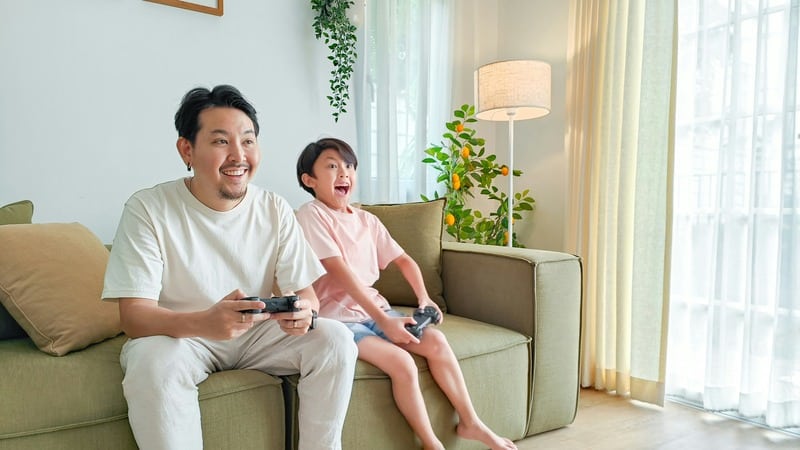Communication is the foundation for all strong relationships, but it’s even more important in a parent-child bond. Communication is not just talking; it’s about how much your child trusts you, understands you, and feels emotionally supported. This article will explain how effective communication shapes parent-child bonds and provide helpful tips to improve this vital relationship.
Actively Listening to Your Child
It is crucial to take the time to listen to your child. Active listening requires attention to words, body language, and emotion. When you are an active listener, your child will feel valued, knowing their thoughts and feelings are of worth. Active listening does not mean simply waiting for your turn to talk; it means engaging in what your child is saying and appropriately responding to them, be it telling a story or showing frustration. Your attention cements it.
Encouraging The Expression Of Emotion
Creating a Safe Space
A crucial part of trusting is creating a safe, non-judgmental space for your child to express their feelings. Your child should never feel any apprehension when sharing their thoughts for fear of some punishment or ridicule. In this regard, when children know they can be open, it strengthens the parent-child bond. This safe space thus provides them with a vantage point from which to handle difficult situations together and foster open communication.
Teaching Emotional Vocabulary
Children, especially younger ones, have a hard time finding words that explain how they’re feeling. It helps to teach them to attach words to those feelings: sadness, frustration, or excitement. As they age, emotional vocabulary will be an excellent tool for discussing issues at hand and will keep the lines of communication open.
Setting Limits By Communicating
Setting Clear Boundaries
Clear, consistent communication is essential whenever there are boundaries or limits. Children are more likely to follow the rules when they understand the reason for them. Explaining the purpose of the rules helps to build mutual respect as your child begins to understand how the boundaries help the whole family. Open communication helps to avoid misunderstandings and strengthens the parent-child bond.
Allowing Input
Rules don’t have to be one-way. They provide your child with an excellent opportunity to express their mind about boundaries so that they are involved in the decision-making process. A discussion like that encourages cooperation and makes them more apt to respect the limits. When children feel they are being listened to, they are more apt to follow the rules, making life easier for everyone in the family.
Dealing With Conflict By Communicating
Being Calm When There Is An Argument
Conflict in any relationship is normal, but how it is solved strengthens or strains the parent-child bond. Remaining calm during an argument demonstrates to your child the importance of respectful communication. In turn, by listening to them and keeping the lines of communication open, the parent solves the issue and teaches them a constructive way to resolve disagreements.
Being Solution-Oriented
If a conflict arises, steer it toward a direction that seeks a solution rather than an accusation. Redirecting the conversation to solutions encourages cooperation and will help your child learn the worth of solving problems together.
Adapting Communication Over Time
Adapting To Their Age
Your communication style should adjust according to your child’s development. Younger children need short, understandable conversations, but teenagers often require subtler, more open discussions. The more sensitive your methods are to your child’s particular developmental period, the easier it will be to communicate and the more confident you can be that your messages will get through. Communicating this way will help your child feel understood and heard, which is crucial for developing a resilient parent-child bond.
Being Approachable
As children grow older, they become more independent, sometimes to a point where they do not feel like talking much. It is essential, however, to let them know that you are there for them and approachable at any time. When they act distant from you, your presence suggests they will always have somewhere to go whenever they need help. As they mature, open communication helps keep the parent-child bond strong.
Final Thoughts
The key to a strong parent-child bond is effective communication. Always be ready to listen to your child, encourage open expression of feelings and emotions, set boundaries, and resolve conflicts peacefully. Also, adjust your communication style as your child grows, and you’ll maintain a resilient and lasting parent-child bond.
For More Great Content
Craving top-tier content that covers it all? From electrifying sports highlights and insider entertainment news to expert gaming tips and sharp betting advice, we’ve got you covered. Dive into our curated articles to stay ahead of the game with the latest sports action, uncover the hottest trends in entertainment, and get the lowdown on gaming strategies that could level up your play. Plus, our betting advice will sharpen your edge and boost your chances of winning big. Whether you’re looking to stay updated or gain a competitive edge, our content is your go-to source for all things exciting and relevant. Don’t miss out—explore now and power up your knowledge! Follow us on Twitter/X @TotalApexSports, to stay informed.




